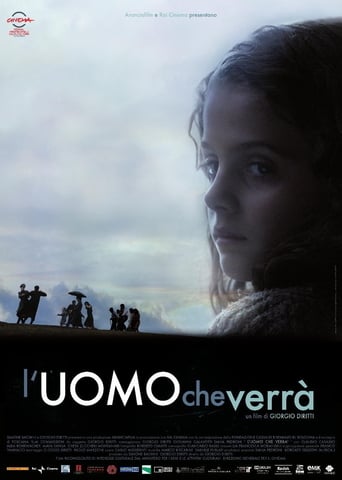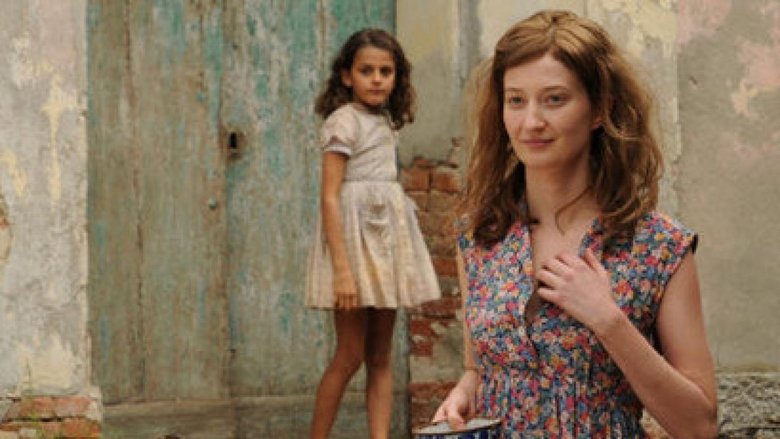

The Man Who Will Come (2009)
A group of Italian villagers struggle to survive during a tumultuous time in 1943, debating how much assistance to give the partisans with the impending arrival of the Germans. Based on True Events.
Watch Trailer
Cast
Reviews
Very very predictable, including the post credit scene !!!
Perfect cast and a good story
It’s not bad or unwatchable but despite the amplitude of the spectacle, the end result is underwhelming.
There's no way I can possibly love it entirely but I just think its ridiculously bad, but enjoyable at the same time.
It's Dec 1943 in rural Italy. Martina is a young girl who has stopped talking. The other kids pick on her. Her mother is pregnant after the lost of her baby brother. Her family works the family farm living under the Nazi occupation. Some of the villagers support the Partisans led by Wolf. The fighting between the Partisans and the Nazis escalate. The Germans round up the locals and massacre them. Martina survives the mass killings and find her newborn brother as the historical event takes place.This takes a lesser known story, outside of Italy, and brings it onto the big screen from the point of view of a child. It is beautifully shot. The story meanders early on but the little girl is compelling enough to keep it interesting. The massacre itself is a rolling train of horrifying events. It's important to tell the tale and this does a good job doing it with beauty and sincerity.
Despite being beautifully shot and well-made (and a few well-done scenes such as the skirmish and execution of a captured German soldier) this one's pretty much a dud...deals with historical events with which most non-Italians are probably not familiar (German atrocities against Italian civilians during the latter half of WWII) but other than cinematically treating a new chapter in that era's history the film doesn't have much to offer, mainly because it uncritically relies on the default narrative/theme for movies on the general subject of WWII in Europe (Germans/Nazis=bad/evil (irrational obsessive homicidal nationalist maniacs), everyone else=good).I guess the size and/or "taste" of the "American" market has to be mentioned as the primary reason many non-American directors find it difficult to make films with moral complexity beyond the imagination of a three-year old? (To give one potential example, (Italian) communist partisans would sometimes ambush German units while the latter were in regions known to be pro-fascist/Mussolini, in the hopes that the Germans were enact reprisals against the local civilians, whom the communists hated as much or more than the Nazis (people often hate those closer to them than those far away)--but would an Italian director dare make such a film? Apparently not.)Edit: To be fair there were a couple of minor details in this direction, such as the SS man who was unable to fire the heavy machine gun and the officer who helped the woman who survived the mass shooting (although that was kind of bizarre itself). But larger themes, such as why was the German presence so bad that the villagers were willing to risk their families to try to get rid of it (all the Germans seemed to do was ask for wine and then pay for it) were lacking. Also the depiction of the Italian civilians was radically naive--were they all really just simple happy country folk who cared only for food, family and Catholicism? Such stereotypes are themselves infantilizing.
I saw "L'uomo che verrà" in a small theater in Florence, Italy last February.One of the beautiful things about the film is that it will appeal to various audiences in very different, albeit powerful ways. It was related to me that the historical events portrayed and implied by the film are quite accurate, so locals from the mountains above Bologna or history buffs won't feel disappointed by an inaccurate rendition. Depending on their demographic other Italians should either be able to sympathize or empathize with characters in the movie as well. For viewers that are not European, I can confidently say that they will find themselves presented with an old theme (Nazi occupation and brutality) delivered in a novel and unique theatrical vessel.Additionally, the cinematography is wonderful. I truly did feel as if I was in the countryside with the characters of the movie being terrorized by a foreign occupying force.As a side note, the movie is in a dialect that most Italians will not even understand. With the good subtitles, I felt that it actually added to the movie's appeal.
"The Man Who Will Come" is a drama set in an Italian's region, the Romagna (and not the Tuscany, although many shots come from there), during the II world war. The movie tells an interesting and cruel episode of the passing of the front in Italy: the Slaughter of Marzabotto, a dreadful tragedy, which becomes greater because of the number of children involved (more than two hundreds less-twelve-years-old children). This is the reason for the title, something like a dedication of the movie to children ("The Man Who Will Come" is a baby who survives to tragedy, he represents the generations of tomorrow), and in order to make stronger this connection history-childhood, a female child who doesn't speak is the protagonist of the movie. Director's aims, when he decides to coming this project, as he said recently, were two: to bring the spectator in a time travel, in a reality unknown for many people, and to narrate the war from the child's point of view. Probably, with this movie he reached to bring the spectator in the past (the choice to use the dialect, as Visconti's La Terra Trema, gives more realism to the narration, and makes the movie more eclectic than the others with the same themes; the care for details, from the lights to the clothes, is almost obsessive) but I think the point of view of the young female is just a little part of the movie: final point of view is quite objective, because there are many points of view, and this gives the taste of a good historical reconstruction. To say that this movie shows the war from the child's point of view is probably reductive, or just wrong: a movie which shows the point of view of a child in some historical period is very different from this work. Result? Nice job, but it's impossible to have an historical reconstruction of facts through a subjective point of view or, if it's possible, this movie couldn't reach it.


